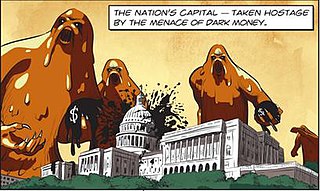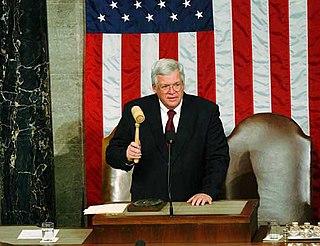Related Research Articles

John Andrew Boehner is an American retired politician who served as the 53rd speaker of the United States House of Representatives from 2011 to 2015. A member of the Republican Party, he served 13 terms as the U.S. representative for Ohio's 8th congressional district from 1991 to 2015. The district included several rural and suburban areas near Cincinnati and Dayton.

Kevin Owen McCarthy is an American politician who served as the 55th speaker of the United States House of Representatives from January to October 2023. A member of the Republican Party, he was the U.S. representative for California's 20th congressional district from 2007 until his resignation in 2023.

Kris William Kobach is an American lawyer and politician who has served as the attorney general of Kansas since 2023. He previously served as the 31st secretary of state of Kansas from 2011 to 2019.

The American Center for Voting Rights (ACVR) was a non-profit organization founded by Mark F. "Thor" Hearne that operated from March 2005 to May 2007 and pushed for laws to reduce voter intimidation and voter fraud, and supported requiring photo ID for voters.

The 114th United States Congress was a meeting of the legislative branch of the United States of America federal government, composed of the United States Senate and the United States House of Representatives. It met in Washington, D.C., from January 3, 2015, to January 3, 2017, during the final two years of Barack Obama's presidency. The seats in the House were apportioned based on the 2010 United States census.

Let Freedom Ring, Inc. is an American conservative advocacy organization. It is organized as a 501(c)(4) entity, and in 2014 created a super PAC. Let Freedom Ring has Colin Hanna as its president and has employed Timothy Goeglein as a consultant.

The Voter Participation Center (VPC) is a U.S.-based 501(c)(3) non-profit organization that seeks to increase voter registration among young people, people of color, and unmarried women, a group it calls "The New American Majority." Its sister organization, the Center for Voter Information, is a 501(c)(4) organization that conducts get-out-the-vote campaigns. VPC runs a large direct mail program, sending voter registration materials to targeted voters. It also produces research material on demographic and voting trends. Between 2004 and 2020, they registered more than 4 million voters. Some election officials and campaigns have contested the group's methods of voter registration and voter turnout. ProPublica reported that VPC's 501(c)(4) sister organization, Center for Voter Information, has "ties to Democrats" and that election officials said that "a flood of mailers" from them "contained mistakes and confused voters at a time when states are racing to expand vote by mail." Election officials said they wished it would stop.

Courage California is a California-based 501(c)(4) progressive grassroots advocacy organization founded in 2005. The organization claims an online grassroots activism network of over 1 million members. The group works on a variety of progressive causes including LGBT equality, gun control and healthcare reform, including support of single-payer health care. The group has taken a role in various California statewide ballot measures, including supporting Proposition 30 and opposing Proposition 32 in 2012.
A nonpartisan organization, in American politics, is a non-profit organization organized United States Internal Revenue Code that qualifies certain non-profit organizations for tax-exempt status because they refrain from engaging in certain political activities prohibited for them. The designation "nonpartisan" usually reflects a claim made by organizations about themselves, or by commentators, and not an official category per American law. Rather, certain types of nonprofit organizations are under varying requirements to refrain from election-related political activities, or may be taxed to the extent they engage in electoral politics, so the word affirms a legal requirement. In this context, "nonpartisan" means that the organization, by US tax law, is prohibited from supporting or opposing political candidates, parties, and in some cases other votes like propositions, directly or indirectly, but does not mean that the organization cannot take positions on political issues.
The American Action Network (AAN) is a nonprofit, conservative issue advocacy group based in Washington, D.C., aligned to the Republican Party. It was established in 2010 by Fred Malek and Norm Coleman as a 501(c)(4) organization.
NGP VAN, Inc. is an American privately owned voter database and web hosting service provider used by the Democratic Party, Democratic campaigns, and other non-profit organizations authorized by the Democratic Party. The platform or service is used by political and social campaigns for fundraising, campaign finance compliance, field organizing, and digital organizing. NGP VAN, Inc. was formerly known as Voter Activation Network, Inc. and changed its name to NGP VAN, Inc. in January 2011. The company was founded in 2001 and is based in Washington, D.C., with an additional location in Somerville, Massachusetts.

In politics, particularly the politics of the United States, dark money refers to spending to influence elections, public policy, and political discourse, where the source of the money is not disclosed to the public.

Mark Randall Meadows is an American politician who served as the 29th White House chief of staff from 2020 to 2021 under the Trump administration. A member of the Republican Party, he also served as the U.S. representative for North Carolina's 11th congressional district from 2013 to 2020. During his legislative tenure, Meadows chaired the Freedom Caucus from 2017 to 2019. He was considered one of Donald Trump's closest allies in the House of Representatives before his appointment as chief of staff.

The Hastert rule, also known as the "majority of the majority" rule, is an informal governing principle used in the United States by Republican Speakers of the House of Representatives since the mid-1990s to maintain their speakerships and limit the power of the minority party to bring bills up for a vote on the floor of the House. Under the doctrine, the speaker will not allow a floor vote on a bill unless a majority of the majority party supports the bill.
Sanford "Sandy" Newman is an American non-profit executive. Between 1982 and 2017, he founded and served as president of three non-profits, Project VOTE!, Fight Crime: Invest in Kids, and Voices for Progress.

In 2013, the United States Internal Revenue Service (IRS), under the Obama administration, revealed that it had selected political groups applying for tax-exempt status for intensive scrutiny based on their names or political themes. This led to wide condemnation of the agency and triggered several investigations, including a Federal Bureau of Investigation (FBI) criminal probe ordered by United States Attorney General Eric Holder. Conservatives claimed that they were specifically targeted by the IRS, but an exhaustive report released by the Treasury Department's Inspector General in 2017 found that from 2004 to 2013, the IRS used both conservative and liberal keywords to choose targets for further scrutiny.
Every Voice was an American nonprofit, progressive liberal political advocacy organization. The organization was formed in 2014 upon the merger of the Public Campaign Action Fund, a 501(c)(4) group, and the Friends of Democracy. Every Voice, along with its affiliated Super PAC, Every Voice Action, advocated for campaign finance reform in the United States via public financing of political campaigns and limitations on political donations. The organization's president, David Donnelly, has said "We fully embrace the irony of working through a Super PAC to fight the influence of Super PACs."
On October 29, 2015, during the 114th United States Congress, an election for speaker of the U.S. House of Representatives was necessitated by the impending resignation of John Boehner, set for October 30. Boehner was the first speaker to resign in the middle of a Congressional term since Jim Wright in 1989.

The 2020 United States Senate election in Michigan was held on November 3, 2020, to elect a member of the United States Senate to represent Michigan. It was held concurrently with the 2020 U.S. presidential election, as well as other elections to the United States Senate, elections to the United States House of Representatives and various state and local elections.
Turning Point Action (TPAction) is an American 501(c)(4) organization, which by law can campaign either for or against candidates running for office. It is an affiliate and the political advocacy arm of the conservative 501(c)(3) Turning Point USA, both founded by Charlie Kirk.
References
- ↑ Underwood, Madison (September 10, 2014). "Mark Lester hits Gary Palmer on 'fees' from 'radical, Tea Party organization'; Palmer fires back". AL.com. Retrieved 30 June 2015.
- ↑ Vogel, Kenneth; Haberman, Maggie (April 22, 2013). "Karl Rove, Koch brothers lead charge to control Republican data". Politico. Retrieved 30 June 2015.
- ↑ Kaplan, Jeremy (November 2, 2010). "Got Voter Fraud? Yeah, There's an App For That". Fox News. Retrieved 30 June 2015.
- ↑ Enloe, Chris. "Boehner's 'Failures' Might Get Him Tossed as Speaker if Trey Gowdy and His Supporters Have Their Way". IJ Review. Archived from the original on 1 July 2015. Retrieved 30 June 2015.
- ↑ House, Billy (December 20, 2012). "Trouble for Boehner's Speakership?". National Journal. Archived from the original on 23 December 2013. Retrieved 30 June 2015.